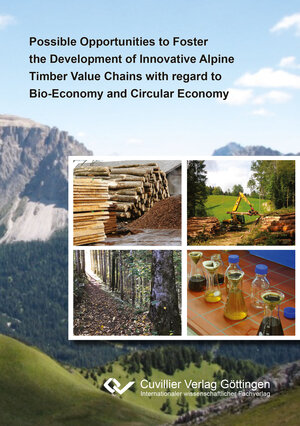Possible Opportunities to Foster the Development of Innovative Alpine Timber Value Chains with regard to Bio-Economy and Circular Economy
von Thomas SchnabelThis book was written in connection with the CirculAlps project, which was launched in January 2018 under EUSALP – the EU Strategy for the Alpine Region – and is supported by the Alpine Region Preparatory Action Fund (ARPAF).
The main objective of the CirculAlps project was to promote circular and bio-economies in the alpine wood sector. The results showed how the innovation and the circular economy in the wood supply chains have recently been identified several times as key elements for mountain regions by institutions such as the Alpine Convention and the European Partnership for the agricultural innovation. The wood value chain can benefit from these approaches, e. g. in the management of discarded wood adding further steps to the life of wood before biomass and the use of waste products as raw materials, e. g. barks as an insulator. There are good practices in and around the EUSALP region, but they are still rare.
The wood value chain, green building innovation and the circular economy in the forest sector were analysed and the specific potential for innovative value chains in the circular and bio-economy sectors in the EUSALP region was assessed. These results will be collected in a feasibility study. Furthermore, the results of the project will be developed in a participatory way. They will examine the missing elements for the forestry entrepreneur to start this new value chain and to create concrete actions and tools to facilitate them. This will create a solid basis for the dissemination of the circular and bio-economy in the forest sector of the EUSALP area.
The main results will be an increase in the effectiveness of collaborative research and innovation activities, which will lead to the emergence of new cross-sector value chains, mainly in focused areas. Furthermore, innovation management capabilities will be enhanced in relevant intermediate organisations such as clusters. The international approach will provide a transnational strategy for the development of the forest sector. These results will be highly replicable and will provide valuable input for policy makers at regional, national and European levels.
The main objective of the CirculAlps project was to promote circular and bio-economies in the alpine wood sector. The results showed how the innovation and the circular economy in the wood supply chains have recently been identified several times as key elements for mountain regions by institutions such as the Alpine Convention and the European Partnership for the agricultural innovation. The wood value chain can benefit from these approaches, e. g. in the management of discarded wood adding further steps to the life of wood before biomass and the use of waste products as raw materials, e. g. barks as an insulator. There are good practices in and around the EUSALP region, but they are still rare.
The wood value chain, green building innovation and the circular economy in the forest sector were analysed and the specific potential for innovative value chains in the circular and bio-economy sectors in the EUSALP region was assessed. These results will be collected in a feasibility study. Furthermore, the results of the project will be developed in a participatory way. They will examine the missing elements for the forestry entrepreneur to start this new value chain and to create concrete actions and tools to facilitate them. This will create a solid basis for the dissemination of the circular and bio-economy in the forest sector of the EUSALP area.
The main results will be an increase in the effectiveness of collaborative research and innovation activities, which will lead to the emergence of new cross-sector value chains, mainly in focused areas. Furthermore, innovation management capabilities will be enhanced in relevant intermediate organisations such as clusters. The international approach will provide a transnational strategy for the development of the forest sector. These results will be highly replicable and will provide valuable input for policy makers at regional, national and European levels.







